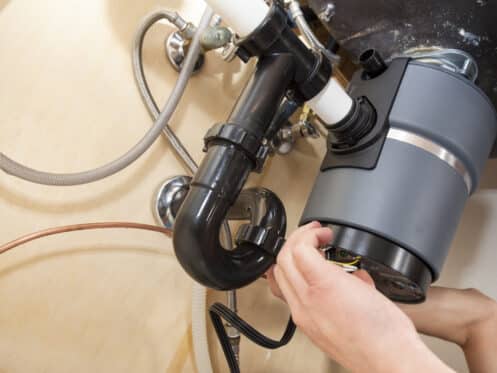Garbage disposals are designed to grind up discarded scraps so that they can be easily washed down the drain without any difficulty. However, if you neglect the maintenance of your disposal, it can lead to malfunctions and even rust damage due to standing moisture. It is essential to be proactive in safeguarding your investment by following the best practices recommended by our team and performing occasional repairs when needed.
Run Cold Water During Usage
When using a garbage disposal, remember that cold water is better at solidifying drain grease, which prevents it from clogging the flywheel components. On the other hand, hot water melts fats, making them dense and gunky as they coat the grinding wheels, so it’s best to avoid using hot water. To ensure your disposal functions smoothly, run cold water into it when you turn it on, and let it flush for at least 60 seconds after turning the switch off to clear any residual debris.
Baking Soda Cleans Odors
Often, unused garbage disposals can develop unpleasant odors like rotten eggs or sewage due to sink water contamination and the erosion of internal components over time. However, pouring a cup of baking soda down the drain and rinsing it can naturally deodorize and absorb the bacteria sludge inside the grinding chamber walls, eliminating the bad smell.
Let the baking soda dissolve overnight for maximum cleaning power against stubborn odors. Sodium bicarbonate won’t damage the metal or plastic disposal parts but will scrape gases away. You can also use occasional lemon juice or vinegar flushes to effectively combat disposal odors through acidic cleansing without the risk of abrasion associated with harsh chemical cleaners. These cleaners could degrade important protective stoppers, seals, and bushings, making the units vulnerable to leaks.
Erase Grease With Ice
Grease buildup in your pipes can cause slow drainage and blockages. To clear this, try throwing a cup of ice cubes down the drain hole and turning on the disposal. As the sharp blades shred the ice, the friction helps to scrub away the grease and grime that has accumulated on the metal walls of the pipes. The melted ice also helps to clear out any food debris that may have been stuck, preventing stubborn sink clogs. You don’t need to use the sink faucet simultaneously because the ice will provide enough water. Wait until the ice has fully melted and the noise has faded before turning off the disposal.
Avoid Expansive Foods
It’s essential to avoid disposing of starchy items such as rice and pasta down the drain as they can expand significantly when in contact with water, causing blockages that can be difficult to clear. Other items that can cause similar problems include greasy potatoes, coffee grinds, and eggshells.
To prevent blockages and ensure your disposal system lasts longer, only dispose of small amounts of meat, fruits, and vegetables at a time. Suppose more oversized items, such as bones or whole eggs, accidentally fall into the disposal. In that case, removing them manually before turning on the disposal is crucial to prevent damage from potential expansion once the water starts flowing.
Lubricate Metal Components
Regular cleaning with soap and water can help metal surfaces slide more freely, reducing friction and strain on tiny internal motor parts. This can help prevent premature failure of the system. Waste disposal mechanisms that endure years of heavy use can benefit from regular maintenance, such as lubricating key sections like spindle assemblies and shredder compartment walls. This decreases overall operational friction, making the system run more smoothly and extending its lifespan.
By extending the system’s operating life, homeowners can save significant replacement costs that would otherwise be necessary when basic models wear out and become unserviceable. Occasionally, applying a plumber’s grease or machine oil lubricant around metal joints can increase longevity significantly. However, using only disposal-safe options and avoiding petroleum-based lubricants that can erode plastic seals from prolonged exposure is essential.
Check Spin Direction
If your disposal suddenly jams, experiences food buildup, or makes odd clanging noises, inspecting the chamber’s spinning direction to ensure proper functionality is essential. During correct operation, dangling utensils should align to a forward clockwise rotation viewed from the bottom. Turn off the power and then test the spin.
If you notice a counterclockwise reverse spin, it often results from wiring errors during installations or improper user reset attempts after clearing previous jams. Reverse spins prevent proper waste grinding mobility and prevent the chamber walls from being contacted evenly, resulting in compromised food and debris removal efficacy and frequent backups.
Contacting plumbers promptly to correct wiring harness issues and restore clockwise motion is essential.
Safely Unjam Blockages
If you hear loud humming from your units instead of the usual sound of spinning water drainage, it is essential to power them off immediately to prevent burnouts. At the same time, homeowners should avoid clearing debris, as most basic stoppages are due to utensils falling down the drains or compacted citrus peels, which cannot be removed by just shedding tap pressure. To clear the blockages, use a special hex wrench to insert it into the centered post bottom and turn the connector rods manually. This will free any stuck contents without risking finger exposure or awkward tool improvisation without proper visibility.
After clearing any visible obstructions, run cold water to check if the spinning sounds return without any odd gurgling. If you hear any strange noises, it indicates further downline clogs that require professional hydro-jetting equipment if manual turns fail to unclog the blocked pipes.
Scrub Mineral Deposits
Areas with hard water tend to accumulate lime and calcium residue, which can cause clogging and reduce water pressure over time. This buildup can be removed using a solution of white vinegar and baking soda. Simply pour the solution into the affected area, allow it to fizz, and scrub away the mineral buildup. Afterward, flush the area with ice cubes and cold water to rinse any remaining acidity and prevent corrosion.
It’s recommended to repeat this treatment as needed to prevent further buildup. You may also want to consider installing a home-wide water filtration system to reduce the effects of hard water.
Replace Corroded Parts Promptly
It’s essential to pay attention to minor signs such as new water leaks near the sink cabinet or stains of iron around the drain below countertop outlets. These signs indicate that the internal parts of your system are corroding as it ages. To diagnose the damage accurately, it’s best to have technicians inspect it visually by appointment. The internal replacement components are critical for continued food waste grinding efficacy and long-term drain line protection from shed metal particulate.
If technicians find that essential interior parts like insulation padding, stopper adjusting rings/seals, or grinding wheels exhibit substantial wear, they should replace them. This will minimize future repair needs until the unit replacement is the most cost-effective option.
Are you looking for a reliable plumbing service provider in your area? Look no further than DeWolfe Plumbing, Heating & Cooling. Our team of experts specializes in diagnosing garbage disposal issues and providing efficient solutions to keep your kitchen clean and safe. We also offer drain cleanings, investigate pipe leaks, install bathroom fixtures, and provide other maintenance or upgrade services to keep your home functioning smoothly. Get in touch with us now to schedule a cost-effective estimate.


